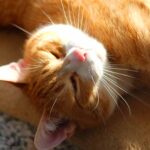Cats have plenty of habits which appear perplexing or inexplicable to us. 'Why do cats eat their hair?' is one such riddle. I know one long haired cat … [Read more...]
Can Cats Breathe Through Their Mouth?
Here’s a fun feline trivia question for you: can cats breathe through their mouth? I have hardly ever seen any of the cats I’ve lived with breathing … [Read more...]
Do Cats Like Sunlight?
In my mind, the archetypal image of a cat has always been of one basking in a pool of sunlight on a bedspread. As you can probably guess from that, … [Read more...]


